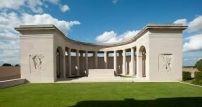| First Name: | Bernard Henry Coleby | Last Name: | HUSK | |
|---|---|---|---|---|
| Date of Death: | 24/11/1917 | Lived/Born In: | East Sheen | |
| Rank: | Private | Unit: | London14 | |
| Memorial Site: | Cambrai Memorial, Louverval, France | |||
Current Information:Age-32 214, Barcombe Avenue, Streatham Hill 5, Furness Lodge, Derby Road, East Sheen
The Battle of Cambrai This was a major British offensive on the Western Front that was launched on 20th November, 1917 and lasted through to the beginning of December. As the name suggests it was an attack towards the city of Cambrai and the important German railhead there, which it was hoped would be captured. The battle was notable for two things: the massed use of tanks for the first time and the success of the first day’s fighting when the formidable Hindenburg Line was breached and gains of five miles were made in places. In celebration the church bells throughout Britain were rung. However this success was short lived. The tanks were not reliable and the German defence stiffened as the fighting progressed and when they counter attacked in force on 30th November, the British came under so much pressure that they were forced to withdraw from many of the positions they had captured earlier on. Both sides suffered around 45,000 casualties during the course of the fighting. 56th Division had not been involved in the first two days of fighting but by 22nd November they had moved into the line in the northern part of the battlefield which was completely dominated by the Bourbon Ridge. This they were ordered to capture and the first steps towards achieving this took place on the morning of 22nd November, when 169 Brigade attacked Tadpole Copse. They made some progress and 14th London of 168 Brigade moved forward to form a defensive flank on the left and with orders to continue the attack the following morning. At 8.00am on 23rd November, 14th London began their attack. They first had to get across Tadpole Copse, which 169 Brigade had not captured the previous day and which was a valley, swept by machine-gun fire. It was not until 2.30pm that D Company, on the right, was able to get behind the enemy here and this was followed by a successful frontal attack. Their next objective was Adelaide Trench which they captured by 4.30pm. Given the hard fighting in which they had been engaged all day it was not surprising that they now found themselves running short of ammunition, especially grenades. A fresh supply was received just in time to beat off a German counter attack but some ground had to be ceded. They remained in these positions overnight and at dawn on 24th November the enemy began to bombard their trenches. In the afternoon the Germans launched a fierce counter attack from Inchy Mill which drove back 14th London from much of the ground they had won on the previous day. Some were able to retreat along communication trenches but others had to do so over the open and suffered serious loss. Their casualties over the two days had been substantial and included Bernard Husk who was killed on 24th November. |
||||
| « Back to Search Results | ||||
| If you think any of the information shown here is incorrect, Click Here to submit your amends and comments | ||||




